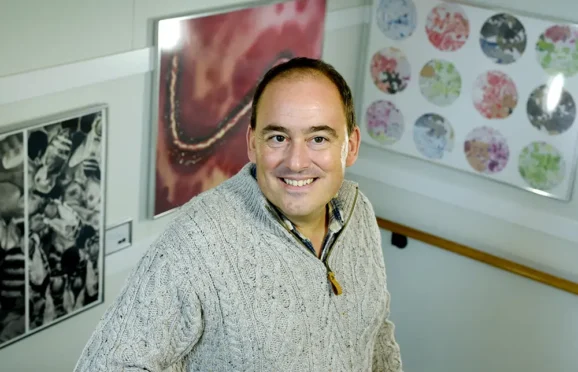Earth at risk of ‘Star Wars-like invasion’, The European’s science correspondent warns

Professor Tim Coulson
- Published
- Opinion & Analysis, Science

Earth might be at risk of an invasion by aliens resembling Jabba the Hutt, The European’s science and environment correspondent has warned
Professor Tim Coulson, an Oxford University biologist, said humans could be “wiped out” by fat, slug-like ETs that look like the Star Wars villain.
In his most recent column, the eminent scientist argued that it is “perfectly rational” to assume intelligent life exists elsewhere in the universe.
And if it does, the technologically advanced creatures he imagines to be “bloated, slow-moving blobs” could try to colonise the planet and plunder our resources.
Professor Coulson, pictured, who has advised governments and written more than 200 peer-reviewed articles, said we should consider flying saucers and other signs of space life to be a threat to mankind.

His warnings come as US firm Firefly Aerospace successfully landed a spacecraft on the moon, paving the way for mankind’s exploration of deep space.
He wrote: “Given aliens are likely made from the same stuff as us, they may very well behave like us.
“Perhaps hi-tech alien spacecraft are already traversing vast tracts of space towards Earth, on a mission to make it a new home for the aliens that built the kit.
“If that is true, we should treat any alien tech that appears in our solar system with extreme caution.”
The question of what aliens might look like – and if they exist at all – has captivated humanity for decades.
Experts have suggested they might resemble anything from jellyfish and shrimp-looking creatures to little green men with pointed heads and large eyes.
But Professor Coulson, who has won awards from major institutions including the Royal Society, believes the most common alien lifeforms would need to be dextrous enough to have created and control the technology around them.
This means they would need jointed arms, multi-digited hands, and organs and brains to make sense of the world around them.
But because advanced alien civilisations will have been reliant on technology to make their lives easier, they will have become “slow, sluggish and largely sedentary”.
Professor Coulson, the author of The Universal History of Us: A 13.8 billion year tale from the Big Bang to you, said if he had to “hazard a guess” about what the most common intelligent aliens looked like, he’d put his money on them “not being enormously athletic”.
“If intelligent aliens have developed technology to visit Earth, it is possible that centuries of reliance on advanced tech means they have become sloth-like: slow, sluggish and largely sedentary,” he wrote.
“They may be bloated, slow-moving blobs – more Jabba the Hut than Chewbacca, perhaps even using robotic tech to help them move around much like Baron Vladimir Harkonnen does in the book Dune.”
The academic said if aliens do exist, they are unlikely to visit Earth without attempting to colonise it for themselves.
He wrote: “There doesn’t seem much point in aliens sending tech part way across the galaxy only for it to send back data it collects thousands of years later – there may be no one left alive to read or interpret the messages.
“The only reason to send a bit of tech into deep space would be to colonise a new home.
“To help them thrive, it might be necessary to remove any species that might hinder their colonisation.
“The tech may well be programmed to wipe out any intelligent inhabitants before humans take over.”
But Professor Coulson, who is widely considered to be one the world’s foremost authorities on biology and evolution, said the chances of ever finding intelligent life beyond our own – or of being invaded – is slim.
“I really hope we do discover evidence of intelligent aliens. But I hope it is by picking up their radio waves that have travelled across space, rather than their technology.
“It is frustrating that the universe is so vast, as I’d love to visit other star systems and planets, but perhaps the huge size has its benefits.
“It makes it challenging for intelligent aliens with colonial intentions to visit us. Given the way we treat other species – even on our own planet – that might be a very good thing.”
Main image: Courtesy Konstantin Finyuk/Pexels
RECENT ARTICLES
-
 WPSL targets £16m-plus in global sponsorship drive with five-year SGI partnership
WPSL targets £16m-plus in global sponsorship drive with five-year SGI partnership -
 Dubai office values reportedly double to AED 13.1bn amid supply shortfall
Dubai office values reportedly double to AED 13.1bn amid supply shortfall -
 €60m Lisbon golf-resort scheme tests depth of Portugal’s upper-tier housing demand
€60m Lisbon golf-resort scheme tests depth of Portugal’s upper-tier housing demand -
 2026 Winter Olympics close in Verona as Norway dominates medal table
2026 Winter Olympics close in Verona as Norway dominates medal table -
 Europe’s leading defence powers launch joint drone and autonomous systems programme
Europe’s leading defence powers launch joint drone and autonomous systems programme -
 Euro-zone business activity accelerates as manufacturing returns to expansion
Euro-zone business activity accelerates as manufacturing returns to expansion -
 Deepfake celebrity ads drive new wave of investment scams
Deepfake celebrity ads drive new wave of investment scams -
 WATCH: Red Bull pilot lands plane on moving freight train in aviation first
WATCH: Red Bull pilot lands plane on moving freight train in aviation first -
 Europe eyes Australia-style social media crackdown for children
Europe eyes Australia-style social media crackdown for children -
 These European hotels have just been named Five-Star in Forbes Travel Guide’s 2026 awards
These European hotels have just been named Five-Star in Forbes Travel Guide’s 2026 awards -
 McDonald’s Valentine’s ‘McNugget Caviar’ giveaway sells out within minutes
McDonald’s Valentine’s ‘McNugget Caviar’ giveaway sells out within minutes -
 Europe opens NanoIC pilot line to design the computer chips of the 2030s
Europe opens NanoIC pilot line to design the computer chips of the 2030s -
 Zanzibar’s tourism boom ‘exposes new investment opportunities beyond hotels’
Zanzibar’s tourism boom ‘exposes new investment opportunities beyond hotels’ -
 Gen Z set to make up 34% of global workforce by 2034, new report says
Gen Z set to make up 34% of global workforce by 2034, new report says -
 The ideas and discoveries reshaping our future: Science Matters Volume 3, out now
The ideas and discoveries reshaping our future: Science Matters Volume 3, out now -
 Lasers finally unlock mystery of Charles Darwin’s specimen jars
Lasers finally unlock mystery of Charles Darwin’s specimen jars -
 Strong ESG records help firms take R&D global, study finds
Strong ESG records help firms take R&D global, study finds -
 European Commission issues new cancer prevention guidance as EU records 2.7m cases in a year
European Commission issues new cancer prevention guidance as EU records 2.7m cases in a year -
 Artemis II set to carry astronauts around the Moon for first time in 50 years
Artemis II set to carry astronauts around the Moon for first time in 50 years -
 Meet the AI-powered robot that can sort, load and run your laundry on its own
Meet the AI-powered robot that can sort, load and run your laundry on its own -
 Wingsuit skydivers blast through world’s tallest hotel at 124mph in Dubai stunt
Wingsuit skydivers blast through world’s tallest hotel at 124mph in Dubai stunt -
 Centrum Air to launch first European route with Tashkent–Frankfurt flights
Centrum Air to launch first European route with Tashkent–Frankfurt flights -
 UK organisations still falling short on GDPR compliance, benchmark report finds
UK organisations still falling short on GDPR compliance, benchmark report finds -
 Stanley Johnson appears on Ugandan national television during visit highlighting wildlife and conservation ties
Stanley Johnson appears on Ugandan national television during visit highlighting wildlife and conservation ties -
 Anniversary marks first civilian voyage to Antarctica 60 years ago
Anniversary marks first civilian voyage to Antarctica 60 years ago



























